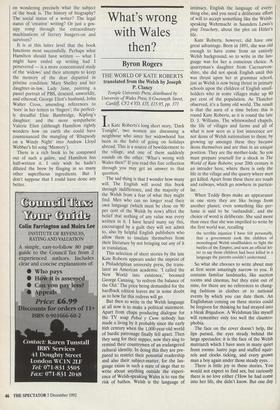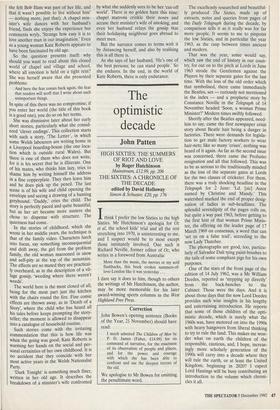What's wrong with Wales then?
Byron Rogers
THE WORLD OF KATE ROBERTS translated from the Welsh by Joseph P. Clancy Temple University Press, distributed by University of Wales Press, 6 Gwennyth Street, Cardiff CF2 4 YD, £35, £15.95, pp. 371 In Kate Roberts's long short story, 'Dark Tonight', two women are discussing a neighbour who since her widowhood has been in the habit of going on holidays abroad. This is a source of bewilderment to the village, and one of them suddenly rounds on the other: 'What's wrong with Wales then?' If you read this fine collection through you may get an answer to that question.
The sad thing is that I wonder how many will. The English will avoid this book through indifference, and the majority of the Welsh from a fear of what they might find. Men who can no longer read their own language (which must be close on 90 per cent of the Welsh by now) affect the belief that nothing of any value was every written in it. I have heard many say this, encouraged by a guilt they will not admit to, also by helpful English publishers who allow them to insulate themselves from their literature by not bringing out any of it in translation.
This selection of short stories by the late Kate Roberts appears under the imprint of a Philadelphian university press, the trans- lator an American academic. 'I called the New World into existence,' boomed George Canning, `to redress the balance of the Old.' The price being demanded for the hardback edition leaves me in some doubt as to how far this redress will go. But then to write in the Welsh language at all now is to make a political statement. Apart from chaps producing dialogue for the TV soap Pobol y Cwm nobody has made a living by it probably since the early 16th century when the 1,000-year-old world of bardic patronage finally fell apart. Then they sang for their supper, now they sing to remind their countrymen of an endangered cultural identity. In doing this they are pre- pared to restrict their potential readership and also their subject-matter, for the lan- guage exists in such a state of siege that to write about anything outside the experi- ence of Welsh-speaking Wales is to run the risk of bathos. Welsh is the language of
intimacy, English the language of every- thing else, and you need a deliberate effort of will to accept something like the Welsh- speaking Wehrmacht in Saunders Lewis's play Treachery, about the plot on Hitler's life.
Kate Roberts, however, did have one great advantage. Born in 1891, she was old enough to have come from an entirely Welsh background, .so to write in the lan- guage was for her a conscious choice. A quarryman's daughter from Caernarvon- shire, she did not speak English until this was thrust upon her at grammar school, just as Welsh is now being thrust in primary schools upon the children of English small- holders who in some villages make up 80 per cent of the population. As Thatcher observed, it's a funny old world. The result is that the aura of a time before this is round Kate Roberts, as it is round the late D. J. Williams. The whitewashed chapels, the life of villages and farms and all of what is now seen as a lost innocence are not ikons of Welsh nationalism to them; by growing up amongst these they became ikons themselves and are thus in an unique position. They are the mother-lode. So you must prepare yourself for a shock in The World of Kate Roberts; your 20th century is an intruder here, where there is only the life in the village and the quarry where men get killed. Apart from these there are roads and railways, which go nowhere in particu- lar.
When Teddy Boys make an appearance in one story they are like beings from another planet; even something like per- fume is said to be 'outlandish', and the choice of word is deliberate. She said more than once that she was impelled to write by the first world war, recalling
the terrible injustice I have felt personally, that a government took the children of monolingual Welsh smallholders to fight the battles of the Empire, and sent an official let- ter to say those children had been killed in a language the parents couldn't understand.
So what she chooses to write about may at first seem amazingly narrow to you. It contains familiar landmarks, like auction rooms and cinemas, but they exist out of time, for there are no references to chang- ing fashions in clothes or to national events by which you can date them. An Englishman coming on these stories could be forgiven for thinking he had strayed into a bleak Brigadoon. A Welshman like myself will remember only too well the claustro- phobia.
The face on the cover doesn't help, the lips pursed, the eyes steady behind the large spectacles: it is the face of the Welsh matriarch which I have seen in many quiet front rooms: lustre jugs and stuffed squir- rels and clocks ticking, and every grown man a boy again under those steady eyes.
There is little joy in these stories. You would not expect to find sex, but curiously there is no love either ('How he had come into her life, she didn't know. But one day she felt Bob Ifans was part of her life, and that it wasn't possible to live without him' — nothing more, just that). A chapel min- ister's wife dances with her husband's friend, finds she enjoys the experience but comments wryly, 'Strange how easy it is to love another man in our imagination.' Even as a young woman Kate Roberts appears to have been fascinated by old age.
So the question presents itself: why should you want to read about this closed world of chapel and village and school, where all emotion is held on a tight rein? She was herself aware that she presented problems:
And here the fear comes back again, the fear that readers will scoff that I write about such unimportant things.
In spite of this there was no compromise; if you enter her world (the title of this book is a good one), you do so on her terms. She was dismissive later about her early short stories, particularly what she consid- ered 'clever endings'. This collection starts with such a story, 'The Letter', in which some Welsh labourers are writing home in a Liverpool boarding-house (the one loca- tion which is outside rural Wales). But there is one of them who does not write, for it is his secret that he is illiterate. One of his mates, who thinks him lazy, tries to Shame him by writing himself the address in a fine copperplate. They then leave him and he does pick up the pencil. The last scene is of his wife and child opening the envelope and seeing a drawing of a hunting greyhound. 'Daddy,' cries the child. The story is perfectly paced and quite beautiful, but as her art became more austere she chose to dispense with structure. The quietness had come. In the stories of childhood, which she wrote in her middle years, the technique is that of the family video. Characters lurch into focus, say something inconsequential and drift away, the girl from the problem family, the old woman marooned in snow and self-pity at the top of the mountain. The effects are so muted they are practical- ly overheard, as in the description of a vil- lage gossip, 'weeding where there weren't weeds'.
The world here is the most closed of all, being for the most part just the kitchen with the chairs round the fire. Fine comic effects are thrown away, as in 'Death of a Story', where the child who has heard all his tales before keeps prompting the story- teller; the moment is allowed to disappear into a catalogue of household routine. Such stories come with the irritating commendation that this is how life was when the going was good; Kate Roberts is warming her hands on the social and per- sonal certainties of her own childhood. It is no accident that they coincide with her most active years in the Welsh Nationalist Party. 'Dark Tonight' is something much finer, written in her old age. It describes the breakdown of a minister's wife confronted by what she suddenly sees to be her 'cut-off world'. There is no golden haze this time: chapel matrons crinkle their noses and accuse their minister's wife of smoking, and even her husband relays the gossip that their holidaying neighbour goes abroad to meet men.
But the narrator comes to terms with it by distancing herself, and also by realising this is all there is.
As she says of her husband, 'He's one of the best persons; he can stand people.' So she endures. In the end, in the world of Kate Roberts, there is only endurance.











































































 Previous page
Previous page